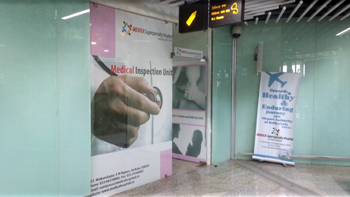EASY CLICKS
Medical
Medical Inspection Room :
- Round The clock Medical Facilities are available at Terminal -2 which are being managed by AAI and Medica Super Speciality Hospital.
- Medical Inspection room in Departure Level is being managed by AAI and they can be contacted at 251198017 /25691033.
- Medical Inspection room at Arrival Level is being managed by Medica Super Speciality Hospital and they can be contacted at 25691128 / 9903388004.
- In case of emergency, passengers can also contact Airport Manager for arranging Medical assistance. The contact No.s are given below:
- Terminal Manager (Departure)- 25118036 / 25691002
- Terminal Manager (Arrival)- 25118038 / 25691003

Health Rules
Yellow Fever : Passengers arriving to India within six days of departure from yellow fever endemic countries and not having valid yellow fever vaccination certificate, will quarantined for a maximum period of six days from the date and time of departure from yellow fever endemic country or till the time when their yellow fever vaccination certificate becomes valid, whichever is earlier.
Polio : Oral Polio vaccine is mandatory for those going to or coming from 8 countries Pakistan, Afghanistan and Nigeria are polio-endemic countries, while five others ‐ Kenya, Ethiopia, Somalia, Syria and Cameroon ‐ got infected from the endemic countries in 2013, according to health officials.
The Government of India had made it mandatory for travellers to and from these countries to take a single dose of OPV in an effort to prevent the importation of poliovirus into the country. Travellers of all age groups should get one dose of OPV at least four weeks prior to travel.
Short-notice trips: In case, any person has to undertake urgent travel to these countries or arrives here on short notice without vaccination, special booths have been set up at the NSCBI Airport.
This vaccination certificate has to be submitted along with the application for visa processing. Passengers should carry the certificate during travel as it will be checked at immigration points at airports.
Functions of Airport Health Organisation, NSCBI Airport, Kolkata
- Airport Health Organisation is the competent authority to implement Indian Aircraft (Public Health) Act and International Health Regulation
- Health Screening: Health screening of International Passengers on arrival in co-ordination with immigration officials and airlines
- Yellow Fever Vaccination and Polio Vaccination: Yellow Fever and Polio vaccine given on every Tuesday & Thursday. One day Prior Booking is required. Vaccination Charge Rs.300/- per Vaccine for Yellow Fever and no charge for polio vaccination. Original Passport along with travel document to be brought at the time of vaccination. Contact Number for Yellow Fever and Polio Vaccination: 033-2511-9044/033-2569-1122/033-2511-9091
[All the International travelers departing to the yellow fever affected countries or arriving to India from yellow fever affected countries are required to receive Yellow Fever Vaccine from authorized Yellow Fever Vaccination Centres at least 10 days prior to travel as the yellow fever vaccine certificate becomes valid 10 days after vaccination.
Yellow fever affected countries are as below:
Central & South America: Argentina, Bolivia, Brazil, Colombia, Ecuador, French Guiana, Guyana, Panama, Paraguay, Peru, Surinam, Trinidad and Tobago, Venezuela (13 countries)
African countries: Angola, Benin, Burkina Faso, Burundi, Cameroon, Central African Republic, Chad, Congo, Equatorial Guinea, Ethiopia, Gabon, Gambia, Ghana, Guinea, Guinea-Bissau, Ivory Coast, Kenya, Liberia, Mali, Mauritania, Niger, Nigeria, Rwanda, Sao Tome and Principe, Senegal, Sierra Leone, Somalia, Sudan, Togo, Uganda, United Republic of Tanzania, Zaire, Zambia (33 countries). For updated list of yellow fever affected countries please visit WHO web site www.mohfw.nic.in or www.who.intAll the International travelers departing to or arriving from Afghanistan, Pakistan, Nigeria, Somalia, Kenya, Syria, Ethiopia and Cameroon should receive a dose of oral polio vaccine (OPV) before travel preferably 4 weeks before travel. For updated information, please visit www.mohfw.nic.in or www.who.int ]
- Surveillance of International Passengers and Crew for yellow fever disease: India is presently free from yellow fever disease, but the country is receptive for Yellow fever due to the presence of Aedes aegypti mosquito, vector of yellow fever. Further, suitable climatic conditions and susceptible human population makes it a potential area where spread of infection can occur. The absence of the disease agent flavivirus fibricus, virus of yellow fever is the main factor responsible for absence of yellow fever in India. Virus of yellow fever, agent can be transmitted to India either via travelers from yellow fever endemic countries or through infected Aedes aegypti mosquito, vector of yellow fever. All the passengers travelling from yellow fever endemic countries or those who have traveled / transmitted from such countries are required to have proper protection from yellow fever (during the period when they were in yellow fever endemic country). Screening of all international passengers is one of the important activities for surveillance. International travelers from Yellow fever endemic countries are required to have proper for Yellow fever vaccination card as per IHR on arrival in India. Primary screening in India is done by the immigration officials during routine immigration clearance.
Standard procedure - all the incoming international passengers of all International flights are screened by the immigration officials for
- H/O travel to yellow fever endemic countries within last 6 days (incubation period of yellow fever) of arriving in India.
- Valid vaccination against yellow fever disease. (Validity of yellow fever vaccination starts 10 days after vaccination and lasts up to 10 years. In case of revaccination the validity starts immediately if the vaccination is taken in the validity period of the previous vaccination).
Passengers who have been in yellow fever endemic countries during the last six days prior to arrival in India and are not having proper vaccination against yellow fever are referred to airport Health office for examination/inspection of vaccination certificate
- Isolation / Quarantine:In order to protect general public from the travelers who may have been exposed to the infection and who do not have proper protection against yellow fever are quarantined in a mosquito free accommodation. Normally, these passengers are apparently healthy persons and are kept under observation.. Passengers are required to stay in quarantine centre for a maximum period of six days from the date and time of departure from yellow fever endemic country or till the time when their yellow fever vaccination certificate becomes valid, whichever is earlier. During the period of quarantine these passengers are medically observed for various signs and symptoms of yellow fever disease. The passengers who develop signs and symptoms of yellow fever during the quarantine period are investigated and managed accordingly.
- Dead Body Clearance:To inspect and issue health clearance certificate of dead bodies brought from abroad (as per the Provisions of The Aircraft (Public Health) Rules, 1954 Part IV rule no. 43 related to the carriage of Dead bodies and Cremated Remains by international Airlines.In this regard, the airlines are required to submit:
- Advance intimation regarding transportation of the Dead body or human remains or ashes of the cremated bodies by the airlines should be given to Airport Health office at NSCBI Airport. (as required under rule above)
- Documents required to be submitted for the purpose of Public Health clearance
- Death certificate issued by a Medical officer in English or translated into English in respect of the dead body.
- Embalming certificate
- NOC is issued by Indian embassy of the country from where body is transported
- Cancelled Passport of the deceased person
- Flight Inspection:To check international flights for detecting the presence of illness, vectors/rodents on board, status of disinsection, general sanitation and hygiene of the flight as per International Health Regulation and Indian Aircraft (Public Health) Act.
- Disinsection of Conveyances:Conveyance operators (airlines agencies) are required to undertake disinsection measures for the aircraft so as to ensure a safe environment for the passengers. Disinsection measures are required routinely for mosquitoes, pests and rodents, however specific measures are to be undertaken during the time of death on board and travel of passengers suspected with infectious disease/PHEIC. Health unit staffs ensure proper aircraft dissinsection and sickness details of travelers by examination of General Declaration of Health (GD) submitted by the Crew at the time of arrival to the Airport Health Organization and by physical inspection of the conveyance for evidence of presence of vectors/disinsection.
- Health measures for travelers, baggages, cargo, containers, conveyances, goods, postal parcels and human remains arriving from an affected area may consider reapplication on arrival, if there are verifiable indications and or evidence that the measures applied on departure from the affected areas were unsuccessful
- Public Health Emergency of International Concern (PHEIC):During the time of PHEIC specific measures are undertaken for the travelers, conveyances, baggage & cargo and all articles which are likely sources of the PHEIC or which can be responsible for transmission of PHEIC to prevent international spread. Measures depend on causative agent, sources and mode of transmission, environmental factors involved in transmission and high risk/susceptible population.
Five broad areas of strategic approach for health sector:- Surveillance and early detection
- Pharmaceutical intervention
- Non-Pharmaceutical intervention
- Clinical management and
- Risk communication.
- Sanitary Inspection:Regular Sanitary Inspection is undertaken to ensure that proper sanitation is maintained in facilities and areas used by the international travelers as per requirements of International Health Regulations. Health inspector/staff undertakes periodic inspection of the premises with regard to cleanliness and hygiene, mosquito breeding places, presence pest and rodents and garbage collections/sanitary disposal of waste. Carriers/conveyances arriving at a port from a foreign country are subjected to a sanitary inspection to determine whether there exist rodent, insect, or other vermin infestation, contaminated food or water, or other insanitary conditions requiring measures for the prevention of the introduction, transmission, or spread of communicable disease.
- Food Safety:All entry ports should have provision of Safe Food for international travelers including food in the conveyances. Under the provisions of Food Safety and Standards Authority of India (FSSAI) notifications, Health officer of the airport has been designated as licensing authority and is responsible for ensuring safety of the food provided at these outlets/lounges and flight kitchens. Airports and ports have lounges and food and snack outlets for provision of food and snacks for the travelers. It is essential that food service personnel protect the health of consumers from food borne illness by practicing clean work habits and following acceptable sanitary procedures, thus creating a sanitary environment. Management has the responsibility of training personnel (with the help of health authorities) in acceptable personal hygiene habits and in sanitary techniques of food handling, with careful (and constant) supervision. Airport health officer undertakes periodic inspection of these establishments.
- VVIP Food Surveillance:Food inspection involves both national and International Heads of States. Food surveillance activities are undertaken for visits of National VVIPs (Inside country and international visits) and International VIPs at the time of their visits to the Kolkata.
- Water Quality:Water Quality monitoring and surveillance on drinking water facilities in the Airport including in all sorts of Food establishments and Aircrafts.
- Vector Surveillance:To undertake vector surveillance (Mosquito, Rodents etc.) in and Airport premises to monitor the vector control measures undertaken by the Airport Management Authority to ensure Aedes mosquito free in 400 meters perimeter of Airport.
- Training:Training imparted to various stakeholders on International Health Regulation and Airport Health Activities. Training given to Immigration officials on surveillance on Yellow Fever and other communicable diseases and other health clearance requirements.
Know Kolkata
-
Kolkata Hotels
Hotels Near Airport
-
Kolkata Nights
Clubs Near Airport
-
Kolkata Hotspots
Tourist Spots Near Kolkata
-
Kolkata Spirituals
Religious Spots
-
Kolkata Food
River Cruise In Ganges


